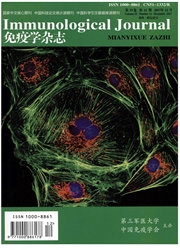

 中文摘要:
中文摘要:
目的评估D蛋白(protein D,PD)黏膜免疫对流感嗜血杆菌感染的保护效果,研究其免疫应答机制,为发展新疫苗提供依据。方法运用分子克隆技术构建PD蛋白表达质粒;用含有或无霍乱毒素(cholera toxin,CT)的PD蛋白黏膜免疫C57BL/6小鼠,ELISA方法检测血清Ig G、唾液Ig A及脾细胞的细胞因子分泌水平;建立定植和致死性感染模型,观察细菌清除及小鼠生存情况;以裸鼠和μMT小鼠来研究细胞和体液免疫应答在PD免疫保护效果中的作用。结果单独PD蛋白黏膜免疫野生鼠能诱导高滴度的抗PD Ig G和s Ig A,血清中Ig G1、Ig G2a和Ig G2b亚型水平相当,脾细胞分泌IL-17A增加,小鼠鼻咽部流感嗜血杆菌清除增加,致死性感染生存率为82%;裸鼠和μMT小鼠免疫PD后对流感嗜血杆菌的清除效应和致死性感染保护作用受损,PD抗血清被动免疫μMT小鼠后其抗感染能力恢复;PD+CT组抗体滴度及脾细胞分泌IL-4和IL-17A水平均高于PD组,细菌清除效应与PD组相似,但无致死性感染保护能力。结论无佐剂PD蛋白黏膜免疫能有效诱导黏膜应答,抵抗流感嗜血杆菌的定植与致死性感染,为黏膜疫苗的发展提供了可能的选择。
 英文摘要:
英文摘要:
Mucosal immunization is a promising vaccination approach to prevent the colonization andsubsequent invasion of critical pathogens. In this study, the protections elicited by Haemophilus influenzae(H.influenzae) protein D(PD) with and without adjuvant cholera toxin(CT) were assessed respectively, and theunderlying protective mechanisms were investigated. Specifically, groups of mice were intranasally immunized withPD or PD plus adjuvant CT for four times at a one-week interval, respectively, and the group given PBS wasregarded as control group. Antibody titers and cytokine levels were measured by ELISA when the vaccinationfinished. Nasopharynx bacterial clearance and survival rates of vaccinated wild mice, μMT mice and nude micewere evaluated respectively. Our results showed that mucosal immunization with PD alone could induce high titers ofanti-PD Ig G in serum and secretory Ig A(s Ig A) in saliva, compared to PBS group, and the Ig G isotypes were mainlyIg G1, Ig G2 a and Ig G2 b. Moreover, IL-17 A level was increased in PD-immunized mice. Immunization with PDcould significantly decrease H. influenzae nasopharynx colonization and improve survival rate of immunized wildmice. However, both bacterial clearance ability and survival protective effect elicited by PD were impaired in μMTand nude mice. Nevertheless, subsequent passiveimmunization with PD-immunized serum could partlyrecover the defense against H. influenzae infection inμMT mice. Enhanced PD-specific humoral andcellular responses as well as similar protection againstbacterial colonization were observed in mice immunized with PD plus CT compared with PD alone, however, no significant protection against fatal infection wereobserved in mice immunized with PD plus CT. In conclusion, intranasal immunization with H. influenzae PD withoutadjuvant can effectively induce mucosal humoral and cellular immune response to defend against colonization andinvasive infection of H. influenzae infection, providing novel vaccine candidates for mucosal vacci
 同期刊论文项目
同期刊论文项目
 同项目期刊论文
同项目期刊论文
 期刊信息
期刊信息
